7A Unit 2 Vocabulary教案
牛津英语7A Unit2 vocabulary完美版

after school. 7. My father always reads n_e_w__s_p_a_p_e_r_s
(报纸)after supper.
school? 3. 3. Annie likes wswimimmmering very much,
and she is a good s_______.
4. Peter listens to the r_a_d_i_o every day. 5. They don’t write letters to each
Amy: No, she doesn’t. She _re_a__d_s
books.
Shirley: Does Sandy l_i_s_te_n__t_o music? Amy: Yes, she does. She also _p_l_a_y_s
badminton.
Shirley: Do Simon and Daniel
8. My mum says we s_h_o_u_l_d_n_’_t (不应) watch too much TV.
9. Daniel p__ra_c_t_i_se_s_ (练习)playing badminton every Friday.
10. Millie and her classmates do afterschool _a_ct_i_v_it_ie_s_ (活动) at 4 p.m. in the afternoon.
play badminton
listen to the radio
Unit2Vocabulary词汇课件牛津深圳版英语七年级上册

just
恰好
Thank you !
6、go to bed 去睡觉(fall asleep 睡着) 7、get up 起床(wake up 叫醒) 8、on foot 步行 9、be full of energy充满活力(=be filled with ….) 10、get... ready for 准备好 11、put on 举办,上演,穿上 12、clean up 打扫干净(tidy up整理) 13、pick up 取,摘,接sb.
4、develop v. 发展
developed adj. 发达的 developing adj. 发展中的 development n. 发展 developed country 发达国家 developing country发展中国家
5、skill n. 技能
skilled/ skillful adj. 熟练的
6、teen adj. 青少年的
数字+teen:fifteen, sixteen teenager n. 青少年(13-19)
7、greeting n. 问候
greet v. 问候
8、energy n. 精力
energetic adj. 精力充沛的 powerful adj.
9、luckily adj. 幸运地
新G7U2 School Life
Words and phrases
1、activity n. 活动
active adj. 积极的
2、practise v. 练习
practice n. 练习 practise doing sth.练习做某事
3、solve v. 解决
solution n. 解决办法
mood 情绪,心情
牛津初中英语AUnitVocabulary教案
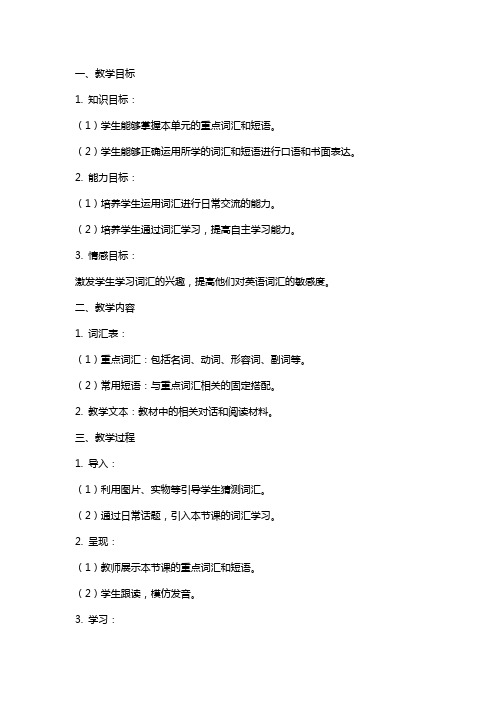
一、教学目标1. 知识目标:(1)学生能够掌握本单元的重点词汇和短语。
(2)学生能够正确运用所学的词汇和短语进行口语和书面表达。
2. 能力目标:(1)培养学生运用词汇进行日常交流的能力。
(2)培养学生通过词汇学习,提高自主学习能力。
3. 情感目标:激发学生学习词汇的兴趣,提高他们对英语词汇的敏感度。
二、教学内容1. 词汇表:(1)重点词汇:包括名词、动词、形容词、副词等。
(2)常用短语:与重点词汇相关的固定搭配。
2. 教学文本:教材中的相关对话和阅读材料。
三、教学过程1. 导入:(1)利用图片、实物等引导学生猜测词汇。
(2)通过日常话题,引入本节课的词汇学习。
2. 呈现:(1)教师展示本节课的重点词汇和短语。
(2)学生跟读,模仿发音。
3. 学习:(1)学生通过教材中的对话和阅读材料,理解词汇的用法。
(2)学生通过小组合作,讨论词汇的搭配和用法。
4. 练习:(1)教师设计不同类型的练习,巩固所学词汇。
(2)学生进行口头和书面练习,展示所学成果。
5. 拓展:(1)学生进行词汇接龙游戏,扩展词汇量。
(2)学生尝试用所学词汇编写小故事或对话。
四、教学评价1. 课堂参与度:观察学生在课堂上的发言和互动情况。
2. 练习完成情况:检查学生口头和书面练习的准确性。
3. 课后作业:评估学生课后作业的完成质量和创新性。
五、教学资源1. 教材:牛津初中英语教材。
2. 辅助材料:词汇卡片、图片、实物等。
3. 技术资源:多媒体教学设备。
六、教学步骤Step 1: Lead-in教师通过展示一幅图片或提出一个问题,引起学生对主题的兴趣。
学生进行思考并发表自己的观点。
Step 2: Presentation教师介绍本节课的主题和目标。
教师展示本节课的重点词汇和短语,并解释其意义和用法。
学生跟读,模仿发音。
Step 3: Learning学生通过教材中的对话和阅读材料,理解词汇的用法。
学生通过小组合作,讨论词汇的搭配和用法。
Step 4: Practice教师设计不同类型的练习,巩固所学词汇。
牛津英语7A_Unit_2_全部教案

牛津初中英语教学案牛津初中英语(7A)Unit 2 My Day第一课时Welcome to the unit设计的基本理念:根据新课标培养学生自主、合作、探究精神、突出语言使用水平培养的理念而设计。
课型:对话、句型操练课1、技能目标:培养学生灵活使用本课所学词汇、句型来表述日常活动的对话水平。
2、知识目标:①重点单词:fun, sleep, a.m, p.m, homework, model, make, newspaper, film, mum, should, right.②重点短语:wake up, go to sleep, have assembly,…③重点句型:I get up at 6 a.m every morning.When do you get up?When do you go to school?What do you do after school?3、情感目标:通过学习谈论日常安排和活动之后,学生能够为自己制定一个合理的学习和生活的日常活动安排表。
4、策略目标:通过日常生活时间来描述自己或他人的日常活动,并学习使用词汇。
5、文化意识目标:时间表达,逻辑思维,做事有条理,时间观点强,珍惜光阴。
课堂教学模式:一学一练一测和任务型教学课前准备:1、准备一个钟。
2、教师或学生画一些日常活动的图片。
3、教师制作日常生活和学习的表格。
4、让学生预习新单词。
教学过程:Step 1: Revision.Review the names of meals and the different activities presented on page 19. Divide the class into groups of four. Brainstorm the topic of daily life activities. Ask Ss to draw an activity if they do not know the word in English.Step 2: Presentation.Talk to Ss about daily routines and activities.Say: I get up at 6 a.m in the morning.When do you get up? etcStep 3: Ask Ss to sort their activities into different sections:Leisure — Sports — Eating — school.Teacher tells Ss to write down the day and time when they typically do these activities. As you go around the class, provide help with vocabulary.Step 4: Each group writes the four lists on the board. Ss can copy the activities they want to include in their diary.Step 5: Work in pairs to talk about their partner’s diary. You can use the following sentence patterns:a. When do you go to school /…/ ?b. Do you go to school by bus /…/ ?c. What do you do after school /…/ ?Step 6: Learn Vocabulary.a. P23 Go through Part A and read the words and phrases correctly. Attention to their pronunciation.b. Ss complete the task and check answers. Encourage Ss to memorize the collocations Part B.c. Let Ss go through Part B and explain the context. Ask Ss to do the task on their own, then check answers. Ss correct any mistakes and the teacher explains something if necessary.d. Divide the class into pairs. Let Ss read the conversation and get some pairs to act it out.Step 7: Practice — task.课堂教学任务。
7A英语Unit 2 Daily lifeVocabulary7年级上 深圳
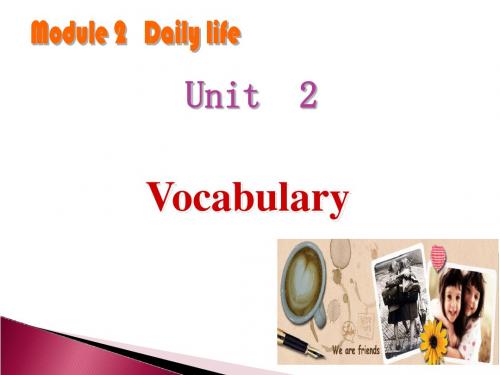
注意:因为……,所以……”时,用了 because就不能再用so,用了so就不能再用 because。请注意下面汉语句子的英语译法:
因为他病了,所以没去上学。 误:Because he was ill, so he didn't go to school. 正:Because he was ill, he didn't go to school. 正:He was ill, so he didn't go to school. 句型结构 1.“原因+so+结果”
so _____ John's bike was broken, ______he was late / for school yesterday
在英文表达中,有了"因为"(because),就不用"所 以"(so); 有了"所以"(so),就不用"因为" (because)。
1). so“如此”、“因此”、“所以”意思。 —I don't think so. —I hope so.
baseball basketball tennis volleyball
6. ride
v. 骑;驾驶
ride - rode(过去时)- ridden
Few people ride bikes in this area.
Xiao Ming rode to school yesterday. xiao Ming went to school by bike yesterday. ride =go to .... by bike
辨析: composition:学生的作文。 article:多指在报刊、杂志上发表的非文艺性 的文章。 essay:评论、讽刺性杂文等。 paper:指高等学校的学期论文,或学校里的 作文
Unit2Vocabulary教学案

Unit2Vocabulary教学案Unit2 vocabulary teaching planUnit2Vocabulary教学案前言:小泰温馨提醒,英语作为在许多国际组织或者会议上都是必需语言,几乎所有学校选择英语作为其主要或唯一的外语必修课。
英语教学涉及多种专业理论知识,包括语言学、第二语言习得、词汇学、句法学、文体学、语料库理论、认知心理学等内容。
本教案根据英语课程标准的要求和针对教学对象是初中生群体的特点,将教学诸要素有序安排,确定合适的教学方案的设想和计划、并以启迪发展学生智力为根本目的。
便于学习和使用,本文下载后内容可随意修改调整及打印。
unit 2 vocabulary教学案课前预习一.写出下列单词的反义词1.necessary2.impo rtant3.populareful5.interesting6. easy二.单词填空。
1.which do you like better,historyor (地理)?.2.english is an important (语言)。
.3.this book is very (有用)please read it carefully .4.this math problem is so (难)that i can’t work it out ..5.it is (不重要的)for us to go there..6.edison is one of thegreat (science)in history..7.it is (无用的)only speaking without doing..8.this book is (有用的)for young students..三.用所给词填空。
1.our g teacher tells us the earth is like a big ball.2.in canada people speak differentl .3.tom often makes noise in class , so he is anu student.4.these things on the deskare (use )。
七年级英语上册《7A Unit 2 My day Welcome to the Unit&Vocabulary》教学案
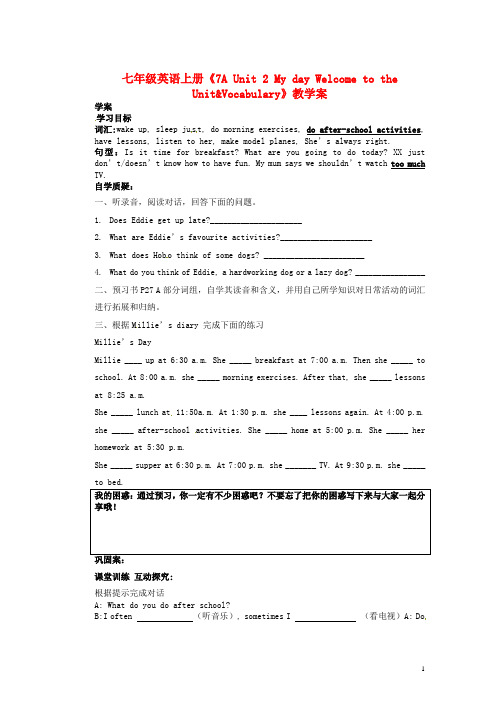
七年级英语上册《7A Unit 2 My day Welcome to theUnit&Vocabulary》教学案学案学习目标词汇:wake up, sleep ju s t, do morning exercises, do after-school activities, have lessons, listen to her, make model planes, She’s always right.句型:Is it time for breakfast? What are you going to do today? XX just don’t/doesn’t know how to have fun. My mum says we shouldn’t watch too much TV.自学质疑:一、听录音,阅读对话,回答下面的问题。
1.Does Eddie get up late?_____________________2.What are Eddie’s favourite activities?_____________________3.What does Hob o think of some dogs? _______________________4.What do you think of Eddie, a hardworking dog or a lazy dog? ________________二、预习书P27 A部分词组,自学其读音和含义,并用自己所学知识对日常活动的词汇进行拓展和归纳。
三、根据M illie’s diary 完成下面的练习Millie’s DayMillie ____ up at 6:30 a.m. She _____ breakfast at 7:00 a.m. Then she _____ to school. At 8:00 a.m. she _____ morning exercises. After that, she _____ lessons at 8:25 a.m.She _____ lunch at 11:50a.m. At 1:30 p.m. she ____ lessons again. At 4:00 p.m. she _____ after-school activities. She _____ home at 5:00 p.m. She _____ her homework at 5:30 p.m.She _____ supper at 6:30 p.m. At 7:00 p.m. she _______ TV. At 9:30 p.m. she _____ to bed.课堂训练互动探究:根据提示完成对话A: What do you do after school?B:I often (听音乐), sometimes I (看电视)A: Doyou like ? (打羽毛球)B: Yes, I do.A: Does your (爸爸) like ?(听收音机)B: Yes, he does.根据中文提示完成句子1. She _______ _______ (醒来) at six every morning2 .We should help ______ ______ (互相).3. Students do ______ _______(课外活动) for an hour every afternoon4. Jim’s _______ _______ (最喜欢的课) are Chinese and English.5. Mum _______ _______ (想要) go to sleep.6. He ______ _______ ________(做他的家庭作业) every evening.have lesso ns1.Don’t ______ your father. He is sleeping.2.At school, we ______ from 8:00 a.m. to 4:30 p.m..3.Sh e usually ______ at 9:45 at night.4.He is always busy So he doesn’t have muc h time _____ to his e-friend It’s time ______. Please wash your hands at once.翻译下列句子1、该上课(睡觉、休息、上学……)了。
7B Unit 2 Vocabulary教案
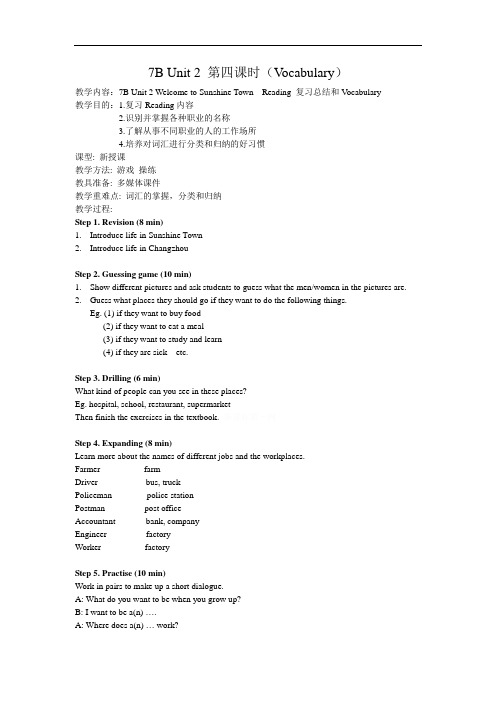
7B Unit 2 第四课时(V ocabulary)教学内容:7B Unit 2 Welcome to Sunshine Town Reading 复习总结和V ocabulary教学目的:1.复习Reading内容2.识别并掌握各种职业的名称3.了解从事不同职业的人的工作场所4.培养对词汇进行分类和归纳的好习惯课型: 新授课教学方法: 游戏操练教具准备: 多媒体课件教学重难点: 词汇的掌握,分类和归纳教学过程:Step 1. Revision (8 min)1.Introduce life in Sunshine Town2.Introduce life in ChangzhouStep 2. Guessing game (10 min)1.Show different pictures and ask students to guess what the men/women in the pictures are.2.Guess what places they should go if they want to do the following things.Eg. (1) if they want to buy food(2) if they want to eat a meal(3) if they want to study and learn(4) if they are sick etc.Step 3. Drilling (6 min)What kind of people can you see in these places?Eg. hospital, school, restaurant, supermarketThen finish the exercises in the textbook.Step 4. Expanding (8 min)Learn more about the names of different jobs and the workplaces.Farmer farmDriver bus, truckPoliceman police stationPostman post officeAccountant bank, companyEngineer factoryWorker factoryStep 5. Practise (10 min)Work in pairs to make up a short dialogue.A: What do you want to be when you grow up?B: I want to be a(n) ….A: Where does a(n) … work?B: He/She works in a …..Ask some pairs to report their dialogues. Step 6. Homework (3 min)Write a short passage about your family members. You should introduce their age, job, workplace, hobbies etc.If necessary, give an oral example.板书设计:vocabularyjobs workplacest eacher/student schooldoctor/nurse hospitalwaiter/waitress/cook restaurantshopper/cashier supermarketfarmer farmdriver bus/truckpoliceman police stationpostman post officeaccountant bank, companyengineer factoryworker factory教学后记:本节课要求学生掌握有关职业和工作场所的词汇,难度并不高,所以可以在书本中列举的词汇之外进行适当的补充引申。
七级英语上册 unit 2 my day vocabulary学案(无答案) 牛津译林版
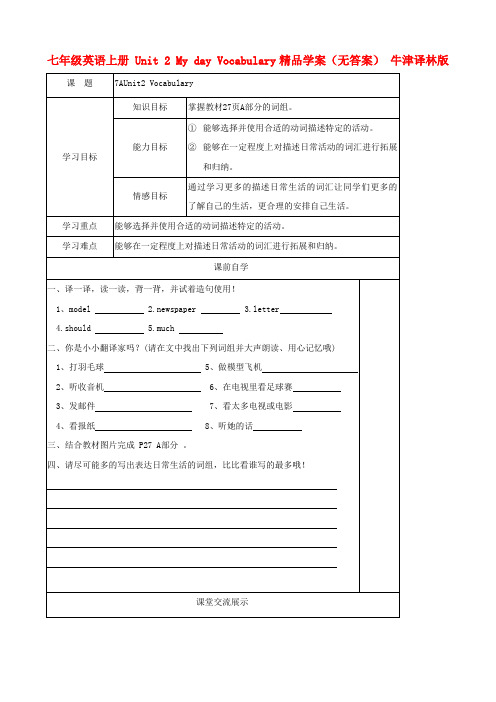
课题
7AUnit2 Vocabulary
学习目标
知识目标
掌握教材27页A部分的词组。
能力目标
1能够选择并使用合适的动词描述特定的活动。
2能够在一定程度上对描述日常活动的词汇进行拓展和归纳。
情感目标
通过学习更多的描述日常生活的词汇让同学们更多的了解自的生活,更合理的安排自己生活。
_______________________________________________________________
_______________________________________________________________
_______________________________________________________________
学习重点
能够选择并使用合适的动词描述特定的活动。
学习难点
能够在一定程度上对描述日常活动的词汇进行拓展和归纳。
课前自学
一、译一译,读一读,背一背,并试着造句使用!
1、model2.newspaper3.letter
4.should5.much
二、你是小小翻译家吗?(请在文中找出下列词组并大声朗读、用心记忆哦)
2.Sandy _______ (listen ) to music and she also ________ (play)badminton .
3.Simon and Daniel ___________ (not write ) letters (信件) .
They _________ (write) e-mails .
Unit2-Vocabulary词汇教学设计2024-2025学年牛津深圳版英语七年级上册
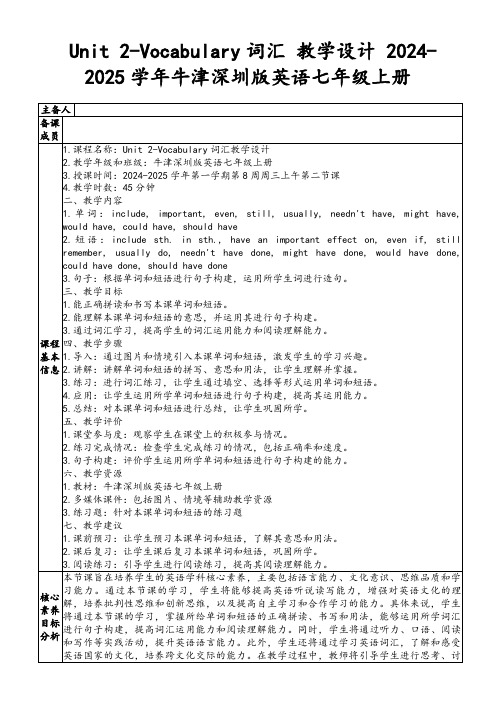
三、教学目标
1.能正确拼读和书写本课单词和短语。
2.能理解本课单词和短语的意思,并运用其进行句子构建。
3.通过词汇学习,提高学生的词汇运用能力和阅读理解能力。
四、教学步骤
1.导入:通过图片和情境引入本课单词和短语,激发学生的学习兴趣。
2.讲解:讲解单词和短语的拼写、意思和用法,让学生理解并掌握。
- 鼓励学生利用网络资源,如英语学习网站、在线英语词典等,进行自主学习和拓展学习。
- 组织学生进行英语角活动,让学生有机会在实际语境中运用所学词汇和短语,提高语言运用能力。
- 引导学生参加英语俱乐部或英语演讲比赛等活动,提高学生的英语综合运用能力。
- 鼓励学生阅读英语小说、杂志、报纸等,扩大词汇量,提高阅读理解能力。
- 定期组织英语语法讲座或辅导课程,帮助学生深入理解和掌握英语语法知识。
- 推荐学生使用英语学习APP,如Duolingo、Memrise等,进行词汇学习和练习。
- 让学生参加英语角活动,与其他学生进行交流和讨论,提高口语表达能力和跨文化交际能力。
教学资源拓展要求:
- 拓展资源要与本节课教学内容相关联,有助于学生的深入学习和发展。
4. 教学手段:
- 小组讨论
- 角色扮演
- 听力练习
- 口语练习
- 阅读练习
- 写作练习
5. 其他资源:
- 英语绘本
- 英语故事卡片
- 词汇游戏
- 学习手册
教学过程设计
1. 导入环节(5分钟)
- 教师通过展示一张图片或一个情境,引导学生思考并提问:“你们认为什么是重要的?”
- 学生发表自己的观点,教师总结并引出本课主题:“Today, we are going to learn about important things.”
Module7Unit2Readingandvocabulary教案

一、教学内容
《Module 7 Unit 2 Reading and vocabulary》
本节课我们将深入学习以下内容:
1. Reading: "The Earth is our home" –理解并分析文章主旨,掌握描述地球环境的重要词汇和表达方式。
(五)总结回顾(用时5分钟)
今天的学习,我们了解了环境保护的基本概念、重要性和应用。同时,我们也通过实践活动和小组讨论加深了对环保词汇和语法的理解。我希望大家能够掌握这些知识点,并在日常生活中灵活运用。最后,如果有任何疑问或不明白的地方,请随时向我提问。
五、教学反思
在今天的教学过程中,我发现学生们对环境保护这个话题非常感兴趣,这让我感到很欣慰。通过引入日常生活中的实例,他们能够更直观地理解我们所学知识的重要性。在授课过程中,我注意到了以下几点:
5.总结回顾环节,学生们对今天所学内容的掌握情况总体良好,但仍有一些疑问。我计划在课后提供一些额外的学习资源,帮助他们巩固知识点,并鼓励他们在课堂上提出问题,及时解决疑惑。
2. Vocabulary:学习并掌握与环保主题相关的词汇,如:pollution, recycle, conserve, ecosystem等。
3.情景对话:通过角色扮演活动,运用新学的词汇讨论环境保护的方法和现实生活中的应用。
4.语法点:现在进行时态在描述环境问题及解决方法中的应用。
5.阅读策略:学习如何快速定位文章信息,提高阅读效率和理解能力。
-语法难点:现在进行时态的构成和正确使用,特别是在复杂句子中的应用。
-阅读理解:理解文章中的隐含意义和作者的态度,如推断作者对某些环保行为的评价。
冀教2011版七年级英语下册《Vocabulary》说课稿

冀教2011版七年级英语下册《Vocabulary》说课稿一、教材内容简介本节课所使用的教材为冀教2011版七年级英语下册的《Vocabulary》单元。
该单元是针对七年级学生学习英语词汇所设计的,旨在帮助学生掌握并运用日常生活中常见的英语单词,提高他们的词汇水平和语言表达能力。
二、教材分析本单元的教材主要由以下三个部分组成:1. 生词表教材提供了一张包含了本单元所涉及的英语单词的生词表。
学生可以通过阅读这个生词表来学习并熟悉这些单词的拼写、发音和意义。
2. 课文本单元共包含了三篇课文,每篇课文都以一种特定的主题为背景,通过描述具体场景和情境来引导学生学习和运用相关的词汇。
学生可以通过朗读并理解这些课文来掌握新的单词和表达方式。
3. 练习本单元的练习部分包含了多种形式的练习题,例如填空、选择题和对话练习等。
这些练习题旨在帮助学生巩固已学习的词汇,检验他们的理解和运用能力。
三、教学目标本课的教学目标主要包括以下几个方面:1.学会本单元所涉及的英语单词的拼写、发音和意义。
2.能够准确地使用这些单词进行口头表达和书面表达。
3.通过课文的阅读和理解,培养学生的阅读能力和语感。
4.通过练习题的完成,帮助学生巩固已学习的词汇,并提高他们的语言运用能力。
四、教学重点和难点本课的教学重点主要包括以下两个方面:1.学生能够准确地掌握本单元所涉及的英语单词的拼写、发音和意义。
2.通过朗读、听力和阅读理解等活动,培养学生的语感和阅读能力。
本课的教学难点主要包括以下两个方面:1.一些学生可能会遇到难以理解和记忆的生词和词组。
2.一些学生可能会对阅读理解活动感到困惑,需要引导和指导。
五、教学准备为了有效地进行本节课的教学活动,教师需要准备以下教学资源和材料:1.冀教2011版七年级英语下册教材《Vocabulary》。
2.学生课本和练习册。
3.多媒体设备。
4.黑板、粉笔。
六、教学过程本节课的教学过程按照以下步骤展开:1. 导入新课教师可以通过提问学生已经学习过的相关知识和单词来导入新课。
七年级英语上册 Unit2 Vocabulary同步授课课件 译林牛津

A composition ______’s likes and dislikes
Unit 2 My day
Vocabulary
What do we do ? have lessons
Do after-school activities play games
play games
play ping pong
do the cleaning
have a party
Act and guess
play basketball
skate
Look and describe
listen to make play read watch write
Complete the conversation
Shirley: Does Millie __m__a_k_e__ model planes? Amy: No, she doesn’t. She ___r_e_a_d_s___ books. Shirley: Does Sandy __li_s_te_n__to___music? Amy: Yes, she does. She also _p_l_a_y_s_badminton. Shirley: Do Simon and Daniel __w_r_i_te___letters? Amy: No, they don’t. They __w_r_i_te___e-mails. Shirley: Do you _w__a_tc_h___football matches on TV? Amy: No, I don’t. My mum says we shouldn’t __w_a_t_c_h__too much TV. Shirley: Yes. We should _l_is_t_e_n_t_o_her. She’s always right!
7B英语教案Unit 2 Vocabulary
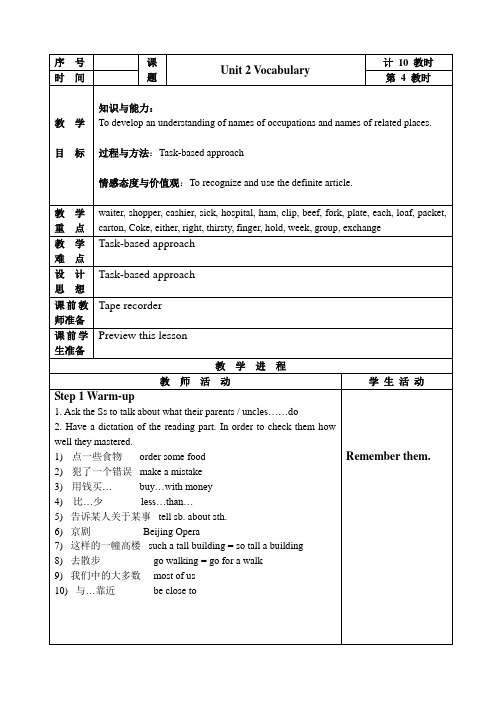
3.He worked foralong time. Heshould stop ________(have) a rest.
4.Tom __________(open) the door and thedoor is ________(open) now.
教学
重点
waiter, shopper, cashier, sick, hospital, ham, clip, beef, fork, plate, each, loaf, packet, carton, Coke, either, right, thirsty, finger, hold, week, group, exchange
4)比…少less…than…
5)告诉某人关于某事tell sb. about sth.
6)京剧Beijing Opera
7)这样的一幢高楼such a tall building = so tall a building
8)去散步go walking = go for a walk
9)我们中的大多数most of us
5.Don’t_________( laugh) at others, its notpolite.
板书设计
Unit 2 Reading (2)
某人在作业方面需要帮助
want/need help with one's homework
体育运动中心sports center
青少年活动中心youth centre
举行一场晚会hold a party = have a party
- 1、下载文档前请自行甄别文档内容的完整性,平台不提供额外的编辑、内容补充、找答案等附加服务。
- 2、"仅部分预览"的文档,不可在线预览部分如存在完整性等问题,可反馈申请退款(可完整预览的文档不适用该条件!)。
- 3、如文档侵犯您的权益,请联系客服反馈,我们会尽快为您处理(人工客服工作时间:9:00-18:30)。
“学程导航”课时教学计划海门市正余中学张新华
7A Unit 2 Vocabulary 预习导学案
一、亲爱的同学们翻译下面的新单词吧!并读一读,背一背!
1、model 2.newspaper 3.letter
4.should
5.much
二、你是小小翻译家吗?(请在文中找出下列词组并大声朗读、用心记忆哦)
1、打羽毛球5、做模型飞机
2、听收音机6、在电视里看足球赛
3、发邮件7、看太多电视或电影
4、看报纸8、听她的话
三、结合教材图片完成P27 A部分。
四、请尽可能多的写出表达日常生活的词组,小组比比看谁写的最多哦!
五、想一想,试一试,你能归纳运用动词play, watch, read, listen的短语吗?Play: ________________________________________________________________ ________________________________________________________________ ________________________________________________________________ Watch: _______________________________________________________________ _______________________________________________________________ Read: ________________________________________________________________ ________________________________________________________________ Listen:
_____________________________________________________________________ _____________________________________________________________________。
